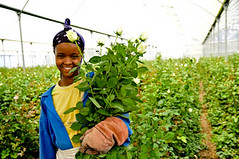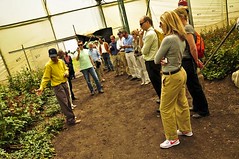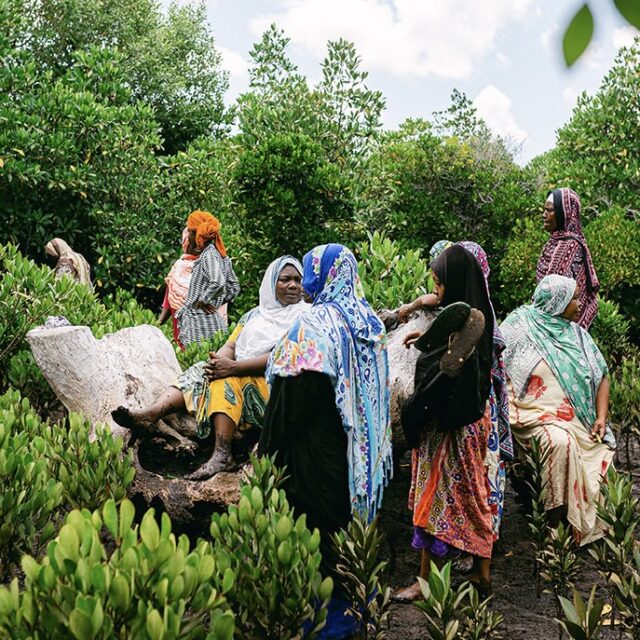From Day 2 of our listening/learning trip to Ghana and Ethiopia. You can read more about our trip here.
 On Wednesday, June 17th, ONE and RED took a group of American influentials just outside Addis to the Golden Rose Agrofarms in the town of Tefki. They are one of the pioneers of the cut flower industry in Ethiopia. Cut flowers are a major agricultural product for Ethiopia and exports have grown from $13 million in 2004/2005 to $23 million in 2005/2006. Estimates are that it could earn $100 million in the next couple of years. The number of cut flower producers has grown from 3 in 2001 to about 40 now. Golden Rose is a family business that started exporting roses in 2000. They currently employ more than 700 people, about 500 of them women, and produce about 80,000 roses a day on about 15 hectares of land. They export 15 million roses a year to Scandinavian countries as well as the Middle East. With money from USAID, Golden Rose is working on expanding their farm, and has already acquired some land next door. This will mean an increased capacity to produce and more people employed in the agriculture sector in Ethiopia.
On Wednesday, June 17th, ONE and RED took a group of American influentials just outside Addis to the Golden Rose Agrofarms in the town of Tefki. They are one of the pioneers of the cut flower industry in Ethiopia. Cut flowers are a major agricultural product for Ethiopia and exports have grown from $13 million in 2004/2005 to $23 million in 2005/2006. Estimates are that it could earn $100 million in the next couple of years. The number of cut flower producers has grown from 3 in 2001 to about 40 now. Golden Rose is a family business that started exporting roses in 2000. They currently employ more than 700 people, about 500 of them women, and produce about 80,000 roses a day on about 15 hectares of land. They export 15 million roses a year to Scandinavian countries as well as the Middle East. With money from USAID, Golden Rose is working on expanding their farm, and has already acquired some land next door. This will mean an increased capacity to produce and more people employed in the agriculture sector in Ethiopia.
The Managing Director of the farm, Ryaz Shamji, took us around the farm with his lovely wife and explained to the group the effort they have put into the sustainable development of Ethiopia as well as ensuring good working conditions for their employees. Golden Rose encourages the employment of those with disabilities, has instituted a contributory program that allows employees to manage the funds and invest in collective projects. We saw the latest project – a grinding machine – being put together on the premises during our tour. Golden Rose also worked with government in the early days to set up incentives to attract additional cut flower producers and these discussions resulted in the creation of tax holidays, easy access to land, access to finance at low fixed interest rates and import duty waivers enjoyed by entrants to the industry today.
 The government favors the flower sector because of the possibility for foreign exchange earnings while absorbing certain amounts of labor. When asked why he worked so hard to encourage additional investors and create competition for himself, Ryaz answered that the more cut flower producers entered the Ethiopian market, the better off Ethiopia would be.
The government favors the flower sector because of the possibility for foreign exchange earnings while absorbing certain amounts of labor. When asked why he worked so hard to encourage additional investors and create competition for himself, Ryaz answered that the more cut flower producers entered the Ethiopian market, the better off Ethiopia would be.
Golden Rose is truly a model farm for sustainable agricultural development in Africa!
-Edith Jibunoh


